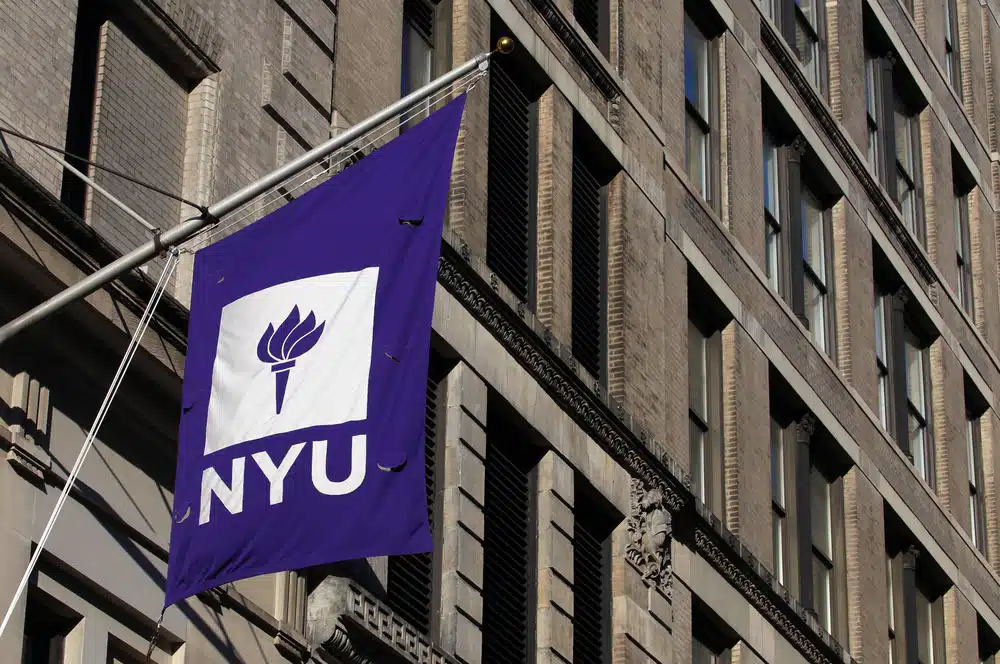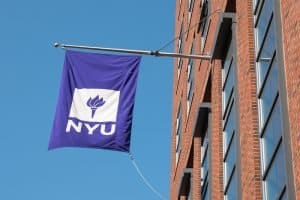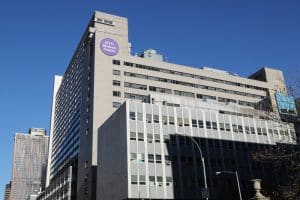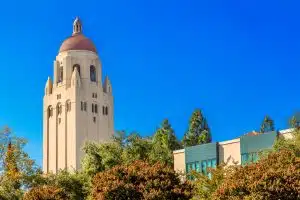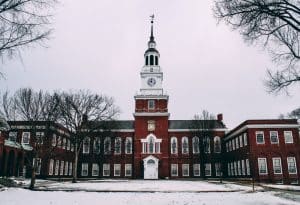Where is NYU Located? You may have asked yourself this question if you are an upcoming college student who has been considering the said university. New York University, or most commonly known as NYU around the world, is one of the largest universities in the country. NYU is also known for being located in a vibrant and progressive city, which adds to its prestige.
This blog details where NYU is located and how the university has contributed to New York City. Moreover, we also provide answers to the following questions:
- Where is NYU located?
- How big is the NYU campus?
- Is NYU private or public?
- What are the facilities available at NYU?
- What is outside the NYU campus?
- What are the famous landmarks inside the NYU campus?
- What are the available housing options at NYU?
- What is NYU’s impact on New York City?
Where is NYU located?
New York University (NYU) is located in New York City, mainly in Manhattan’s Greenwich Village neighborhood. The main campus is at the center of Washington Square Park, with additional facilities spread throughout the city. NYU also has campuses and academic centers around the world, including locations in Abu Dhabi, Shanghai, and other global sites.
In the 1990s, NYU expanded to become a “Two Square” university by establishing a second community around Union Square, around a 10-minute walk from Washington Square.
NYU has three degree-granting campuses and several global academic centers. The main campuses are:
- New York City: The main campus is located in Greenwich Village, Manhattan. It includes different schools and facilities throughout the city.
- Manhattan Location: Most of NYU’s buildings are spread across a square area surrounded by Houston Street to the south, Broadway to the east, 14th Street to the north, and Sixth Avenue (Avenue of the Americas) to the west. The majority of NYU’s main buildings are located within close proximity of Washington Square Park.
- Brooklyn Location: The New York University Tandon School is located in the MetroTech Center at 6 MetroTech Center, one of the largest urban university-corporate parks in the United States.
- NYU Abu Dhabi: Located on Saadiyat Island, this campus focuses on offering liberal arts and sciences education.
- NYU Shanghai: Located in Pudong’s Qiantan district, this campus focuses on liberal arts and sciences aligned with globalization and international affairs.
Additionally, NYU has global academic centers in cities worldwide, including London, Paris, Prague, Madrid, Berlin, Buenos Aires, Accra, and Tel Aviv, which support academic opportunities such as exchange students and study abroad programs.
How big is the NYU campus?
NYU’s main campus in New York City is located in Manhattan, primarily centered around Washington Square Park. The campus extends over 230 acres in an area bordered by Houston Street to the south, Broadway to the east, 14th Street to the north, and Sixth Avenue (Avenue of the Americas) to the west.
NYU has further expanded its influence within New York City with a significant campus in Downtown Brooklyn, the Tandon School of Engineering. This campus is part of the MetroTech Center, one of the largest urban university-corporate parks in the United States (NYU).
Is NYU private or public?
New York University (NYU) is a private university. It is one of the largest private universities in the United States, offering undergraduate, graduate, and professional programs across its various campuses and global academic centers.
New York University (NYU) was founded in 1831 by a group of prominent New Yorkers led by then-Secretary of the Treasury Albert Gallatin. Their vision was to establish a university that would be “in and of the city,” drawing its energy and inspiration from the diverse and dynamic environment of New York City.
Unlike other private universities of the time, which were often associated with religious institutions, NYU was founded as a non-denominational institution committed to inclusivity and accessibility, with the aim to to serve the middle class of the then rapidly growing New York City.
Throughout its history, NYU has maintained its status as a private university while expanding its reach and influence in different parts of the world. It has become one of the largest private universities in the United States.
NYU’s commitment to global education is reflected in its establishment of degree-granting campuses in Abu Dhabi and Shanghai, as well as numerous academic centers around the world. This global network supports a diverse student body and different academic opportunities, aligning itself to its original founding vision of a university deeply integrated with the urban and global community.
What are the facilities available at NYU?
New York University (NYU) offers world-class facilities to support its entire student body and academic programs. The facilities at NYU cater to academic, residential, recreational, and cultural needs and contribute to NYU’s prestige as a top-notch academic institution.
Academic Facilities
- Bobst Library: The main library at NYU, Bobst offers extensive resources, study spaces, and special collections. It is one of the largest academic libraries in the United States.
- Silver Center for Arts and Science: This building is home to the university’s College of Arts and Science and includes many classrooms, lecture halls, and faculty offices.
- Tisch School of the Arts: This facility provides state-of-the-art resources for students in film, theater, and other performing arts disciplines.
- Bern Dibner Library of Science and Technology: Located at the Tandon School of Engineering, this library supports engineering and technology research and learning.
Residential Facilities
- Carlyle Court: A residence hall for upperclassmen with modern living spaces and communal areas.
- Palladium Residence Hall: Features suite-style living and is located near Union Square.
- Third North Residence Hall: A large dormitory with various amenities, including a dining hall and study lounges.
- Othmer and Clark Residence Halls: Located at the Tandon School of Engineering, providing housing options for students in Brooklyn.
Recreational and Cultural Facilities
- NYU Skirball Center for the Performing Arts: The premier venue for cultural and performing arts events at NYU.
- Palladium Athletic Facility: A huge gym and fitness center available to students, faculty, and staff.
- Violet Cafe: A popular dining spot on campus offering international food options.
- Washington Square Park: While not an NYU-owned facility, the park is central to campus life and often hosts student activities and events.
Specialized Facilities
- Langone Medical Center: A world-renowned medical and research institution affiliated with NYU that provides healthcare education and services.
- Global Center for Academic and Spiritual Life: A facility dedicated to supporting the different spiritual and religious needs of the NYU community.
These facilities enhance the academic, residential, and extracurricular experience at NYU, supporting its mission to provide a high-quality education in one of the world’s most vibrant cities.
What is outside the NYU campus?
NYU’s main campus is located in the heart of New York City, particularly in the vibrant neighborhood of Greenwich Village. This location offers students access to various cultural, recreational, and professional opportunities right outside the campus boundaries.
Cultural and Recreational Attractions
- Washington Square Park: Adjacent to the main campus, this iconic park serves as a central gathering place for students and the local community. It features open spaces, fountains, and various performances and events.
- Broadway Theaters: A short distance from NYU, students can easily access Broadway, and they are home to numerous theaters showcasing performances and musicals all year round.
- Museums and Galleries: The area around NYU is rich with cultural institutions, including the Whitney Museum of American Art, the Rubin Museum of Art, and numerous small galleries that showcase contemporary and classical art.
Dining and Shopping
- Union Square: Located near the campus, Union Square is a bustling area with a famous farmers’ market, numerous shops, and a variety of dining options ranging from casual eateries to high-end restaurants.
- SoHo: Just a short walk from the campus, SoHo is known for its trendy boutiques, art galleries, and stylish cafes, offering students a place to shop and relax.
Professional and Academic Opportunities
- Silicon Alley: The area around the Flatiron District and Chelsea, known as Silicon Alley, is home to many tech startups and established tech companies; its close proximity to the campus provides internship and job opportunities for students in tech and business fields.
- Financial District: A short subway ride from NYU, the Financial District offers opportunities for students who want to pursue careers in finance, banking, and law, with institutions like the New York Stock Exchange and major financial firms located there.
Nightlife and Entertainment
- East Village: This neighborhood is known for its vibrant nightlife, with numerous bars, clubs, and live music venues that cater to a variety of tastes and preferences.
- Comedy Clubs: NYC is famous for its comedy scene, with venues like the Comedy Cellar and Upright Citizens Brigade offering regular shows featuring both established and up-and-coming comedians.
NYU’s campus is close to diverse, vibrant neighborhoods, giving students a rich academic and social experience within New York City.
What are the famous landmarks inside the NYU campus?
NYU’s campus is home to several notable landmarks. These landmarks contribute to the university’s rich history and vibrant campus life.
Elmer Holmes Bobst Library
While Bobst Library has been mentioned in terms of its resources, it is also an architectural landmark. Designed by Philip Johnson and Richard Foster, the library’s striking atrium features a dramatic design with red and black marble and is a central hub for student activity and study.
Brown Building of Science
This historic building is known for its association with the Triangle Shirtwaist Factory fire of 1911, an important event in labor history. Today, it houses various science departments and labs, serving as a reminder of the building’s significant place in history.
NYU Bookstore
Located near the main campus, the NYU Bookstore is a place to buy textbooks and also serves as a cultural hub, hosting author readings, book signings, and other literary events.
Casa Italiana Zerilli-Marimò
This cultural center is dedicated to the study of Italian culture and language. It hosts numerous events, including lectures, film screenings, and art exhibitions.
Torch Club
The NYU Torch Club is a historic meeting place for faculty, alumni, and students. It hosts various events, including lectures, dinners, and receptions.
King Juan Carlos I of Spain Center
This center is dedicated to the study of Spain and the Spanish-speaking world. It hosts conferences, lectures, and cultural events. It provides a space for academic and cultural exchange related to Hispanic studies.
Silver Towers
These are three residential skyscrapers designed by renowned architect I.M. Pei. They serve as faculty housing and include a notable Picasso sculpture, “Bust of Sylvette,” in their courtyard, adding an element of public art to the campus.
These landmarks not only enhance the aesthetic and historical value of the NYU campus but also provide unique spaces for learning, cultural exchange, and community building.
What are the available housing options at NYU?
NYU offers a variety of housing options to accommodate its diverse student body. These options range from traditional residence halls to apartment-style living, catering to both undergraduate and graduate students.
Undergraduate Housing
First-Year Residence Halls
- Founders Hall: Located near Union Square, offering double and triple rooms with shared bathrooms and a dining hall.
- Lipton Hall: Close to Washington Square Park, featuring double rooms and a dining hall that also serves as a popular study spot.
- Rubin Hall: A traditional-style hall with a focus on community living, located just a block from Washington Square Park.
Upperclassmen Residence Halls
- Carlyle Court: Suite-style living located in the East Village, offering modern amenities and communal spaces.
- Palladium Residence Hall: Near Union Square, features suite-style rooms, a dining hall, and a fitness center.
- Third North Residence Hall: One of the largest dorms, offering apartment-style living with kitchen facilities and a large dining hall.
Graduate Housing
Stuyvesant Town
Located a short distance from the main campus, this complex offers spacious apartments for graduate students and families, with access to various amenities and green spaces.
Washington Square Village
Apartment-style housing located near the main campus, providing one- to three-bedroom units for graduate students, faculty, and staff, with playgrounds and community spaces.
Specialized Housing
Themed Engagement Floors
These are available in various residence halls and focus on themes such as sustainability, social justice, and cultural exchange, providing residents with unique programming and a sense of community centered around shared interests.
Residential College Programs
Located in certain residence halls, these programs offer a smaller, tight-knit community with special academic and extracurricular programming, designed to enhance the residential experience through learning and engagement.
Housing Services and Amenities
Dining Facilities
Most residence halls have dining halls or are located near NYU dining facilities, offering meal plans that cater to various dietary needs and preferences.
Fitness Centers
Several residence halls, such as Palladium and Third North, feature on-site fitness centers, promoting health and wellness among students.
Study and Common Areas
Residence halls are equipped with study lounges, common areas, and recreational spaces to foster a sense of community and provide comfortable environments for studying and socializing.
These diverse housing options at NYU are designed to provide students with a comfortable and supportive living environment that enhances their academic and social experiences.
What is NYU’s impact on New York, NY?
NYU significantly and multifacetedly impacts New York City, contributing to its economic, cultural, and social fabric. As one of the largest private employers in the city, NYU employs over 19,000 faculty and staff members, whose spending on housing, goods, and services boosts the local economy.
The university’s operational and capital expenditures also have a considerable economic impact, with an annual operating budget exceeding $3 billion. Significant portions of this budget are allocated to local vendors and service providers, and NYU’s construction projects contribute millions more to the economy.
NYU’s cultural contributions are equally noteworthy. The Tisch School of the Arts is a leading institution in film, theater, and performance arts and contributes to the city’s cultural scene. The university hosts numerous public lectures, art exhibitions, performances, and cultural events that are open to the community.
Community engagement is another key area in which NYU makes an impact. The university’s students, faculty, and staff contribute thousands of volunteer hours to local nonprofits, schools, and community organizations. NYU Langone Health provides critical healthcare services, including charity care and community health programs.
In terms of educational impact, NYU collaborates with local schools through initiatives like the Steinhardt School‘s partnerships with NYC public schools, providing professional development for teachers and enrichment opportunities for students. The university’s extensive scholarship programs and outreach initiatives make higher education accessible to a diverse student body, including many first-generation college students from New York City.
Historically, NYU has played a role in significant events, such as the Triangle Shirtwaist Factory fire of 1911, which led to major labor reforms. The university has also been a center for social activism and political movements.
NYU’s research activities contribute to advancements in various fields and often collaborate with local industries and government agencies to address urban challenges. Through entrepreneurship programs and incubators like the NYU Tandon Future Labs, the university supports the development of new businesses and technologies, further enhancing New York City’s position as a global innovation hub. Overall, NYU’s impact on New York City has been profound and encompasses many aspect of the city’s development and growth.
Frequently Asked Questions
Is there public transportation around NYU?
Yes, New York University (NYU) is well-connected by public transportation. The main campus in Greenwich Village is accessible via several subway lines: A, C, E, B, D, F, M, N, R, W, and 6. Key stops include West 4th Street-Washington Square, 8th Street-NYU, and Astor Place. The 1 line stops at Christopher Street-Sheridan Square, just west of campus. Several MTA bus routes, like the M1, M2, M3, and M5, also serve the area, providing convenient transportation throughout Manhattan.
The PATH train system connects New York City with New Jersey, and the 9th Street PATH station is close to NYU. NYC’s bike-sharing program, Citi Bike, has numerous docking stations around NYU. While not directly next to the main campus, NYC’s ferry system offers additional options, especially for those traveling from other boroughs or waterfront areas.
NYU also provides shuttle services for students, connecting various campus buildings and residential areas. Most public transportation options around NYU are equipped with accessibility features like elevators, ramps, and designated seating, ensuring everyone can use them.
What are NYU’s most popular programs?
New York University (NYU) is known for its high-quality academic programs. The Tisch School of the Arts attracts students worldwide for its film, television, and performing arts programs. The Stern School of Business stands out for its focus on finance, marketing, and management. NYU’s School of Law consistently ranks among the top law schools in the country, offering a wide range of specializations.
The Gallatin School of Individualized Study is unique, allowing students to design their own interdisciplinary curriculum. The Steinhardt School of Culture, Education, and Human Development is highly regarded worldwide for its education, applied psychology, and music programs.
Who are NYU’s most popular alumni?
New York University (NYU) has an impressive list of successful alumni. Martin Scorsese, the director of “Taxi Driver” and “Goodfellas,” graduated from Tisch School of the Arts. Lady Gaga, the global pop star and actress known for “Bad Romance” and “A Star is Born,” also attended Tisch. Alec Baldwin, famous for “30 Rock” and many films, is another Tisch alumnus.
Spike Lee, the pioneering filmmaker behind “Do the Right Thing” and “Malcolm X,” graduated from Tisch as well. Angelina Jolie, Academy Award-winning actress and humanitarian, studied at the Gallatin School of Individualized Study. Alan Greenspan, former Chairman of the Federal Reserve, earned his bachelor’s, master’s, and doctoral degrees in economics from NYU. The late Philip Seymour Hoffman, acclaimed actor of “Capote” and “The Master,” also attended Tisch.



